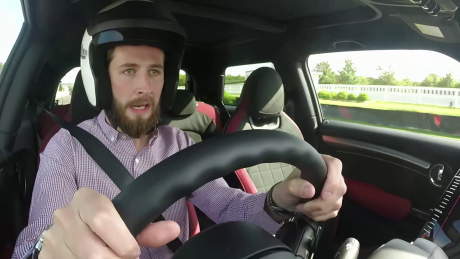Driving is more physical than you think
Driving's just a case of sitting on your arse and letting the car do the hard work. Right? Wrong

When MINI invited us down to Goodwood to drive the John Cooper Works Hatch – their most powerful car yet – we failed to see the relevance to fitness. Then we clocked the biometric readings Portsmouth University took on the day and our jaws dropped. The setup was simple: get a quick crash course in track driving, get driven round by a pro, and then take control of the wheel ourselves for a lap. Heart rate monitors measured our cardio response, while GoPros captured our ridiculous facial expressions.
“In situations of fear and excitement, the body reacts according to a combination of our thoughts and survival instinct – reactions are faster, our heart rate increases,’ says Dr Chris Wagstaff. "This is part of the evolutionary fight or flight response humans developed many hundreds of years ago. However, in the absence of natural predators to trigger such responses, humans occasionally seek out risks or thrills. Being in a MINI delivered enough exhilaration to activate this response.”
Don't believe him? Check out MF's Tommy and his look of terror in the image above.
But how did the driving (and being driven) affect us? According to the chaps from University of Portsmouth driving the John Cooper Works Hatch provoked a more dramatic physical response than skydiving. The fact we're terrible drivers probably skewed the results a little but they measured the reactions of some other guys too. The results were as follows, and it's interesting to note it's not just a physical response that's elicited, but an emotional one too i.e. we were crapping ourselves to.
· The average heart rate increased by 100% when driving
· The average heart rate increased by 80% as a passenger
· The maximum heart rate achieved as a driver was 181bpm, and was 153bpm on average
· The maximum heart rate achieved as a passenger was 153bpm, and was 127bpm on average
· From rest to being a passenger self-reported anxiety increased by 288%
· From rest to driving self-reported anxiety increased by 370%
· Average reaction time performance improved by 6% after driving
· Average reaction time performance improved by 4% after being a passenger
We're not advocating hopping in the car every time you need to go to the shops, but this puts some perspective on the physical rigours of high-intensity driving. It also means you shouldn't book in a track experience on your rest day.
Find out more about the John Cooper Works Hatch
Sign up for workout ideas, training advice, reviews of the latest gear and more.
Coach is a health and fitness title. This byline is used for posting sponsored content, book extracts and the like. It is also used as a placeholder for articles published a long time ago when the original author is unclear. You can find out more about this publication and find the contact details of the editorial team on the About Us page.

